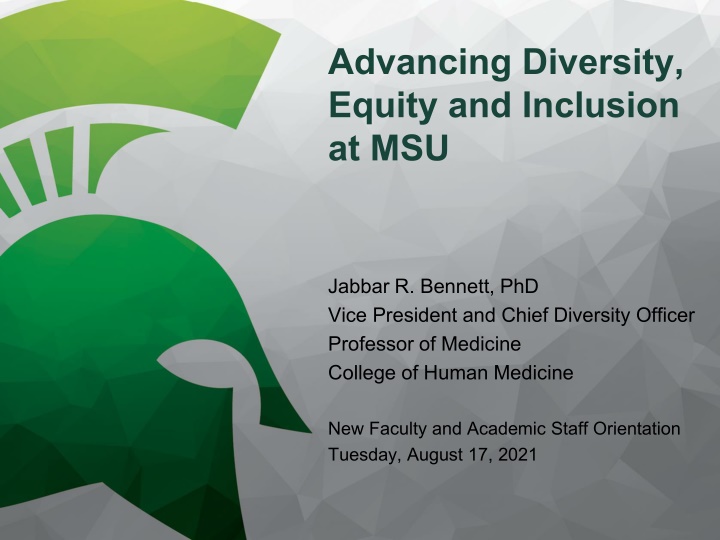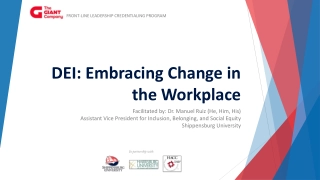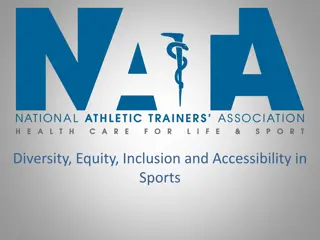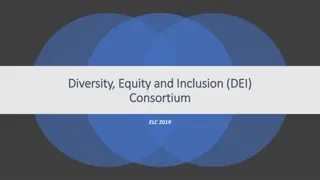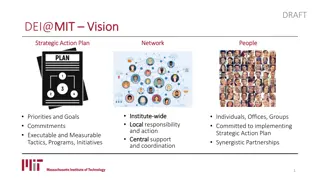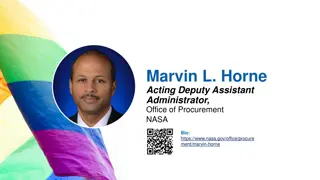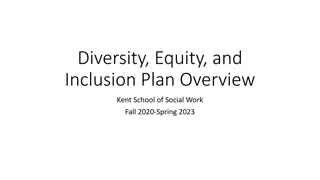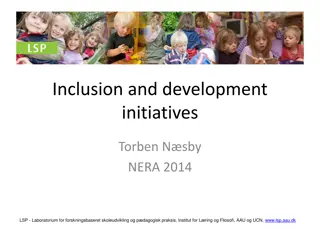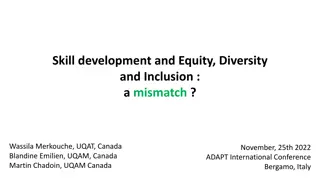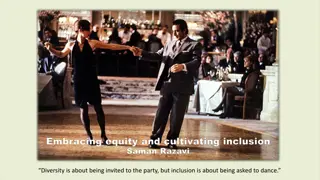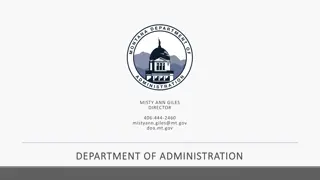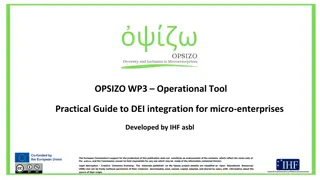Advancing Diversity, Equity, and Inclusion at MSU
Explore Michigan State University's historical approach and institutional commitment to advancing diversity, equity, and inclusion. Understand the definitions of diversity, inclusion, equity, and inclusive excellence, and learn about federally-mandated protected classes in the United States. This presentation highlights MSU's proactive efforts in promoting a more inclusive campus environment.
Download Presentation

Please find below an Image/Link to download the presentation.
The content on the website is provided AS IS for your information and personal use only. It may not be sold, licensed, or shared on other websites without obtaining consent from the author.If you encounter any issues during the download, it is possible that the publisher has removed the file from their server.
You are allowed to download the files provided on this website for personal or commercial use, subject to the condition that they are used lawfully. All files are the property of their respective owners.
The content on the website is provided AS IS for your information and personal use only. It may not be sold, licensed, or shared on other websites without obtaining consent from the author.
E N D
Presentation Transcript
Advancing Diversity, Equity and Inclusion at MSU Jabbar R. Bennett, PhD Vice President and Chief Diversity Officer Professor of Medicine College of Human Medicine New Faculty and Academic Staff Orientation Tuesday, August 17, 2021
Outline To review MSU s historical approach to advancing diversity, equity and inclusion To discuss MSU s commitment to inclusive excellence To explore the role of the Office for Inclusion and Intercultural Initiatives in advancing institutional strategic priorities
Definitions Diversity the condition of having or being composed of differing elements, especially, the inclusion of different types of people (such as people of different races or cultures) in a group or organization Inclusion the act or practice of including and accommodating people who have historically been excluded (as because of their race, gender, sexuality, or ability) Equity justice according to natural law or right, specifically, freedom from bias or favoritism Inclusive Excellence active, intentional and ongoing engagement with diversity in ways that increase personal and social awareness, content knowledge, cognitive sophistication and empathetic understanding of one another Sources: https://www.merriam-webster.com, https://www.aacu.org
MSUs Historical Approach to Advancing Diversity, Equity and Inclusion
Institutional Commitment to Advancing Diversity, Equity and Inclusion For more than 50 years, Michigan State University has sought to provide central support for the recruitment, retention and advancement of students, faculty and staff who are members of underrepresented groups Equal Opportunity Programs (1968 1973) Human Relations Department (1973 1992) Affirmative Action Compliance and Monitoring (1992 2007) Office for Inclusion and Intercultural Initiatives (2007 Present)
Protected Classes in Employment United States Federally-Mandated Protected Classes Employers in all 50 states are legally prohibited from discriminating against people due to race, color, national origin, religion, sex (including pregnancy and childbirth), disability, age (40 and older), citizenship status, and genetic information. State of Michigan Additional Protected Classes In addition to all of the federally mandated protected classes listed above, Michigan also lists marital status, AIDS/HIV status, height, weight, and misdemeanor arrest record as protected classes.
Office for Inclusion and Intercultural Initiatives (1 of 2) Institutional Compliance Responsibilities Oversee Equal Employment Opportunity (EEO), Affirmative Action Program/Plan (AAP), VETS 4212 Report for Federal Contracting Approve Executive and Faculty Hiring Processes Advise on Hiring and Employment Practices Prop 2 (Michigan Constitutional Amendment) Monitor process and diversity (EEO/AAP) efforts Review and approve interview lists and search plans Support and liaise with Faculty Excellence Advocates (FEAs) and Associate/Assistant Deans for Diversity Retain search committee activity records Exploring development of an institutional Supplier Diversity Program
Office for Inclusion and Intercultural Initiatives(2 of 2) While the work initially focused on meeting federal, state and local compliance regulations, it has evolved to address the following institutional priorities: Increase diversity Ensure equity Promote inclusion Enhance outreach and engagement
Office for Inclusion and Intercultural Initiatives Organizational Chart
Office for Inclusion and Intercultural Initiatives (cont d) Major Activities Annual Diversity and Inclusion Report Awards and Programs Education Hiring and Recruiting Research and Grants Organization of Efforts Compliance Diversity Research Network Education and Development Outreach and Engagement
Office for Inclusion and Intercultural Initiatives Awards and Programs Purpose To acknowledge and celebrate individuals and events of cultural and historical significance. Awards Dr. Martin Luther King Jr. Scholarship Excellence in Diversity Awards Future Leaders Scholarship Hispanic Latino Commission of Michigan Celebrations Cesar Chavez and Dolores Huerta Commemorative Celebration Dr. Martin Luther King Jr. Day Commemorative Celebration Juneteenth Celebration New Faculty and Staff Welcome Reception (Fall Semester)
Office for Inclusion and Intercultural Initiatives Education Purpose To explore complex issues through dialogue and sharing experiences. Programming Anti-Racist Path Dialogue Series DEI Foundations Online Educational Module Implicit Bias Certificate Program MSU Dialogues Transforming Theater Ensemble Other Services Consultation Facilitator Training
Office for Inclusion and Intercultural Initiatives Education (2020 2021) Anti-Racist Path Dialogue Series ~300 participants 35 collaborators ~30 contact hours over 20 weeks DEI Foundations Online Module 11,823 (98.5%) faculty/staff completed 44,915 (90.3%) students completed Implicit Bias Certificate Program 525+ participants 17 cohorts 15+ collaborators/units ~90 contact hours MSU Dialogues 450+ participants (over time) 21 cohorts (race, religion, other)
Office for Inclusion and Intercultural Initiatives Research and Grants (1 of 3) Creating Inclusive Excellence Grants (CIEG) Helps colleges and academic units engage in efforts that will enhance academic quality, and through clearly articulated outcomes, demonstrably benefit students and create a more inclusive campus community for all. Diversity Research Network (DRN) Connects faculty of color and scholars interested in diversity research, to create scholarly communities, facilitate new interdisciplinary collaborations, and to advance the growth and visibility of research by underrepresented faculty as well as research on diversity across MSU.
Office for Inclusion and Intercultural Initiatives Research and Grants (2 of 3) Diversity Research Network (DRN) Programming (2017 2021) DRN Writing Spaces and Share Outs Annual Reception Launch Awards Program Share Out Lunches Researcher s Workshop Government Grants Webinar Faculty Study Break DRN Writer s Mafungo Ford Panels and Invited Speakers Graduate Student Liaisons Summer Stay Retreat Foundation Application Training Leadership Bench & Senior Scholar Upcoming Enhancement of Connections Within and Beyond MSU* Interdisciplinary Research Collaboratives Awards Accountability Partnership Program
Office for Inclusion and Intercultural Initiatives Research and Grants (3 of 3) Diversity Research Network (DRN) Highlights (2016 2021) ~650 Faculty and Scholars Served Annually ~90 Faculty Participated in Summer Stay Retreat ~70 Scholars Participated in Researcher Workshop and Consultation ~55 Scholars Participate in Fall Retreat Annually ~25 Scholars Funded Through Launch Award Program ~18 Scholars Participate in Accountability Program
Our Key Partners Division of Student Affairs and Services Greater Lansing Community Human Resources Office of Admission Office of the President Office of the Provost Council of Diversity Deans Dean s Council Office of University Advancement State of Michigan Student and Faculty Governance Student, Faculty and Staff Affinity Groups
MSUs Commitment to Inclusive Excellence
Role of Chief Diversity Officers Source: R.L. Worthington, Advancing Scholarship for the Diversity Imperative in Higher Education: An Editorial. Journal of Diversity in Higher Education, 5:2, 2012; National Association of Diversity Officers in Higher Education
DEI Vision Michigan State University (MSU) will be recognized as a national leader in the advancement of knowledge by the most diverse and exemplary cadre of students, trainees, faculty, staff and alumni who transform lives through equitable teaching, research, scholarship and practice. DEI Goals 1. To recruit, train and hire the most diverse and exemplary cadre of students, trainees, faculty and staff 2. To support retention, safety, well-being and promote success of members of underrepresented groups at MSU 3. To enhance the overall living, learning and working experience of members of the Spartan community 4. To bolster outreach, engagement and economic development throughout the State of Michigan and beyond Note: Informed by MSU Mission Statement.
DEI Goals, Objectives, and Strategic Priority Alignment DEI Objectives Related Current Strategic Priorities DEI Goals Recruit, Train and Hire Increase Diversity Improve Productivity Address Key Employee Shortages Academic Hiring Manual Diversity, Equity and Inclusion Plan MSU Strategic Planning Process Task Force on Racial Equity Circles of Success Mentoring Program Diversity, Equity and Inclusion Plan MSU Strategic Planning Process Multicultural Center Feasibility Study Relationship Violence and Sexual Misconduct Plan Task Force on Racial Equity Diversity, Equity and Inclusion Plan MSU Strategic Planning Process Multicultural Center Feasibility Study Relationship Violence and Sexual Misconduct Plan Task Force on Racial Equity MSU Strategic Planning Process Diversity, Equity and Inclusion Plan Support Retention, Safety, Well-Being and Promote Success Increase Satisfaction Offer Education and Training Provide Clarity on Path Toward Advancement Nurture Inclusion Improve Outcomes Enhance Overall Living, Learning and Working Experience Promote Inclusive Teaching and Learning Enhance Productivity Improve Performance Bolster Outreach, Engagement and Economic Development Build Trust Strengthen Reputation Expand Supplier Diversity Enhance Patient Diversity, Quality of Care and Health Outcomes Increase Revenues
Inclusive Excellence Bolster Outreach, Engagement and Economic Development Enhance Overall Learning, Living and Working Experience Support Retention, Safety, Well-Being and Success Recruit, Train and Hire
Task Force on Racial Equity (1 of 4) Appointed by President Stanley in August 2020 and charged to focus on the following: Campus Climate and Safety Chair Jonglim Han, MA, Interim Program Director, Dow STEM Scholars; Neighborhood Student Success Collaborative Faculty and Staff Diversity Chair Quentin Tyler, PhD, Associate Dean for Diversity, Equity and Inclusion; Director, MSU Extension, College of Agriculture and Natural Resources Policing Chair Jennifer Cobbina, PhD, Associate Professor, School of Criminal Justice, College of Social Science Source: https://president.msu.edu/initiatives/dei-plan/racial-equity-taskforce.html
Task Force on Racial Equity (2 of 4) Campus Climate and Safety Working Group Guiding Principle Immediate actions alone won t remove systemic barriers to effectively advancing diversity, equity and inclusion (DEI) Recommendations Building Trust Communication Incident Awareness Supporting Diversity, Equity and Inclusion Source: https://president.msu.edu/initiatives/dei-plan/racial-equity-taskforce.html
Task Force on Racial Equity (3 of 4) Faculty and Staff Diversity Working Group Guiding Principle Attracting, retaining and supporting faculty and staff members who are reflective of and responsive to the student population MSU serves is of great importance as we focus on overall student success and employee satisfaction Recommendations Expanding Hiring Efforts Longer Range Issues Data Analysis, Information Gathering and Research Source: https://president.msu.edu/initiatives/dei-plan/racial-equity-taskforce.html
Task Force on Racial Equity (4 of 4) Policing Working Group Guiding Principles A safe, welcoming and respectful campus climate will help enhance the recruitment and retention of diverse faculty and staff and ensure all students and trainees are supported A respectful and accountable MSU Police Department is a necessary component of a healthy campus climate Recommendations Expanding Inclusion and Anti-Bias Unit Budget and Services Oversight and Accountability Safety and Service Source: https://president.msu.edu/initiatives/dei-plan/racial-equity-taskforce.html
Task Force on Racial Equity Working Group Reports Campus Climate and Safety Faculty and Staff Diversity Policing Next Steps Tentative Timeline Action Explore Feasibility of Proposed Recommendations Fall 2021 Engage Key Stakeholders Fall 2021 Prioritize Proposed Recommendations and Actions Fall 2021 Determine Appropriate Metrics Fall 2021 Spring 2022 Establish Accountability Fall 2021 Spring 2022 Secure Support to Advance Efforts Spring Summer 2022 Explore Implementation Fall 2022 Source: https://president.msu.edu/initiatives/dei-plan/racial-equity-taskforce.html
DEI Steering Committee (1 of 3) Announced by President Stanley in December 2019 and charged to: Produce a university-wide inventory of DEI efforts and initiatives Aggregate feedback across campus and from alumni and external partners Review and highlight best practices and insights on DEI efforts from benchmarking Identify and recommend metrics, central and unit based, to measure on-going progress for DEI across MSU; as well as unit/role accountability for DEI initiatives and outcomes across MSU Make recommendations for a Strategic DEI Planning Process for the university, with short-term, mid-range and long-term action items and goals, with the end goal of making MSU a national leader in this area Considered the following key questions: 1. How will the MSU community define diversity, equity and inclusion? 2. What does it mean to be a leader nationally in this area? 3. How do we integrate diversity, equity, and inclusion into the larger strategic plan? 4. How can we align our valuable resources with our priorities? Source: https://president.msu.edu/initiatives/dei-plan/about.html
DEI Steering Committee (2 of 3) Co-Chairs Luis Garcia, MA, Director, Migrant Student Services Wanda Lipscomb, PhD, Associate Professor, Department of Psychiatry; Senior Associate Dean for Diversity and Inclusion, College of Human Medicine Members 26 Faculty, Staff and Students 10 Advisors and Project Team Members Process Convened from January 2020 April 2021 Established 8 Work Groups Conducted 53 Listening Sessions with 400+ Participants Generated 200+ Recommendations Source: https://president.msu.edu/initiatives/dei-plan/about.html
DEI Steering Committee (3 of 3) Emerging Major Themes Increase Diversity Ensure Equity Promote Inclusion Enhance Outreach and Engagement Next Steps Tentative Timeline Action Explore Feasibility of Proposed Recommendations Fall 2021 Engage Key Stakeholders Fall 2021 Prioritize Proposed Recommendations and Actions Fall 2021 Determine Appropriate Metrics Fall 2021 Spring 2022 Establish Accountability Fall 2021 Spring 2022 Secure Support to Advance Efforts Spring Summer 2022 Explore Implementation Fall 2022 Source: https://president.msu.edu/initiatives/dei-plan/about.html
Short-Term Work Group on Name and Pronoun Usage Executive Sponsors Melissa Woo, PhD, Executive Vice President for Administration, and Chief Information Officer Jabbar R. Bennett, PhD, Vice President and Chief Diversity Officer Co-Chairs Elisa Landaverde, Librarian, Special Collections, Main Library Stacia Moroski-Rigney, PhD, Affiliated Graduate Faculty, Department of Writing, Rhetoric, and American Cultures, College of Arts and Letters, and Director, CAL Citizen Scholars Program Kris Renn, PhD, Professor, Higher, Adult, and Lifelong Education, College of Education, and Associate Dean, Undergraduate Studies for Student Success Research Members 19 Faculty, Staff and Students Convened from April 2021 July 2021
Short-Term Work Group on Name and Pronoun Usage(cont d) Charge To explore ways in which names and pronouns can be captured and utilized consistently across various university systems and processes. Objectives To identify and potentially connect systems which capture names and pronouns To provide options within each system to input and access self-reported data, e.g., honorifics, gender identify, sexual identity/orientation, pronouns To explore the creation of university policies and communication which support the consistent use of names and pronouns in written and oral communication Recommendations Data Policy Document Systems Inventory Guidelines Statement of Expectations for Faculty and Staff
Top Priorities for 2021 2022 1. Bolster infrastructure 2. Enhance marketing and communication 3. Increase outreach and engagement 4. Align with and advance institutional goals Diversity, Equity and Inclusion Strategic Planning a. Task Force on Racial Equity Recommendations Institutional Strategic Planning 1. 2.
